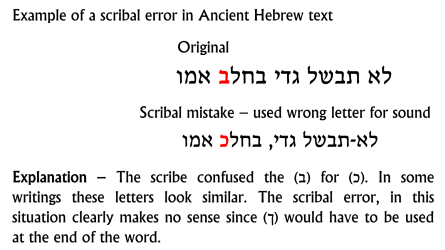The law:
First, a couple of Hebrew terms:
I know nothing about Egyptian Karaite Hebrew literacy. Still, I'm not convinced that scribal error should be discounted.
Thoughts?
The mixture of meat and dairy (Hebrew: בשר בחלב, romanized: basar bechalav, lit. 'meat in milk') is forbidden according to Jewish law. This dietary law, basic to kashrut, is based on two verses in the Book of Exodus, which forbid "boiling a (goat) kid in its mother's milk"[1] and a third repetition of this prohibition in Deuteronomy.[2] [source]
First, a couple of Hebrew terms:
- חָלָב (n-m) heb; halav: milk
- חֶלֶב (n-m) heb; helev: fat
The commandment not to cook a kid in its mother’s milk appears three times in the biblical text with the exact same wording. It is important to note that the MT reads ḥălēv (milk) and not ḥēlev (fat). If anyone wants to argue that the prohibition is about fat and not milk one has to prove without a doubt that the MT uses the wrong reading (Some Egyptian Karaites who didn’t read Hebrew very well made this mistake in the past). However, Jewish reading traditions, Samaritan, and Greek traditions show it is milk. Hence, the discussion will only be based on this common reading and not the speculation of what may have been (Propp, 2006, 286). [source]
I know nothing about Egyptian Karaite Hebrew literacy. Still, I'm not convinced that scribal error should be discounted.
Thoughts?

